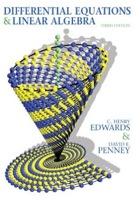
|
Differential Equations
2250-4 home page
|

|
Lecture notes will be posted by 4:00 p.m. the day before class. I strongly recommend bringing a copy of these notes to class, so we can go through the concepts and fill in the details together.
Week 1: January 7-11
jan7.pdf jan7.mw Introduction to course and Chapter 1.
jan8.pdf jan8.mw 1.1-1.2 solving first order differential equations by direct and indirect antidiffererntiation techniques.
jan9.pdf jan9.mw 1.2 continued, introduction to 1.3 slope fields and the graphs to solutions of first order initial value problems.
jan11.pdf jan11.mw 1.3-1.4 slope fields and the local existence of unique solutions to IVP's, illustrated with separable DEs.
Week 2: January 14-18
jan14.pdf jan14.mw 1.3-1.4 continued.
jan15.pdf jan15.mw 1.4-1.5 applications of separable DE's; introduction to linear DE's.
jan16.pdf jan16.mw 1.5 linear differential equations and input-output modeling
jan18.pdf jan18.mw E.P. 3.7 linear DE's from electrical circuits; begin 2.1 improved population models.
Week 3: January 22-25
jan22.pdf jan22.mw 2.2 autonomous differential equations, equilibria, stability.
jan23.pdf jan23.mw 2.2 continued
jan25.pdf jan25.mw 2.3 improved velocity models.
Week 4: January 28 - February 1
jan28.pdf jan28.mw 2.3 continued.
jan29.pdf jan29.mw 2.4-2.6 numerical methods for approximate solutions to first order differential equations.
numericaltemplate.pdf algorithms for Euler, improved Euler, Runge Kutta.
jan30.pdf jan30.mw conclude Chapter 2, then begin 3.1-3.2.
feb1.pdf feb1.mw 3.1-3.3 Gaussian elimination and reduced row echelon form, for the solution set to systems of linear algebraic equations.
feb1workedexamples.pdf feb1workedexamples.mw details from the three worked exercises involving three linear equations in three unknowns.
Week 5: February 4 - February 8
feb4.pdf feb4.mw 3.2-3.3 Gaussian elimination, row echelon, and reduced row echelon form.
feb5.pdf feb5.mw 3.3 using the reduced row echelon forms of augmented and coefficient matrices to deduce the possible solution spaces for associated systems of linear equations.
feb6.pdf feb6.mw 3.4 matrix algebra.
feb8.pdf feb8.mw 3.5 matrix inverses.
Week 6: February 11 - February 15
feb11.pdf feb11.mw 3.5-3.6 matrix inverses and determinants
feb12.pdf feb12.mw 3.6 continued
exam1review.pdf exam1review.mw review questions for exam 1, for Wednesday discussion.
feb15.pdf feb15.mw 4.1-4.3 linear combination concepts for vectors: span
Week 7: February 19 - February 22
feb19.pdf feb19.mw 4.1-4.3 linear combination concepts: linear independence and dependence.
feb20.pdf feb20.mw 4.1-4.3 linear combination concepts: vector space, subspace, basis.
feb22.pdf feb22.mw 4.2-4.4 linear combination concepts: explicit and implicit definitions of subspaces, basis, dimension.
Week 8: February 25 - March 1
feb25.pdf feb25.mw 4.4 and key facts from 4.1-4.4.
feb26.pdf feb26.mw 5.1 second order linear differential equations.
feb27.pdf feb27.mw 5.2 key facts for nth order linear differential equations.
mar1.pdf mar1.mw 5.2: linear independence tests for functions. 5.3: how to use the characteristic polynomial to find the solution space for homogeneous constant coefficient linear DE's; the algorithms for distinct and repeated real roots.
Week 9: March 4 - March 8
mar4.pdf mar4.mw 5.3 How to find yH(x) for constant coefficient linear homogeneous differential equations.
mar5.pdf mar5.mw 5.4 Mechanical oscillation problems.
mar6.pdf mar6.mw 5.4 Pendulum model; experiment set-ups.
mar8.pdf mar8.mw 5.5 Finding yP for L(y)=f.
Week 10: March 18 - March 22
mar18.pdf mar18.mw 5.5 continued: undetermined coefficients and variation of parameters, for finding yP.
mar19.pdf mar19.mw 5.6 undamped forced oscillations.
mar20.pdf mar20.mw 5.6 damped forced oscillations; also, using conservation of energy for undamped problems to find natural frequencies.
mar22.pdf mar22.mw 10.1-10.2 introduction to the Laplace transform and how it can be used to solve initial value problems for linear differential equations.
Week 11: March 25 - March 29
mar25.pdf mar25.mw 10.1-10.3 Laplace transforms and initial value problems.
mar26.pdf mar26.mw 10.2-10.3 Laplace transforms and Chapter 5 initial value problems continued; partial fractions review.
exam2review.pdf exam2review.mw review questions for exam 2, for Wednesday discussion.
exam2reviewfilledin.pdf
mar29.pdf mar29.mw 10.4-10.5 Laplace transforms for unit step functions and convolutions, plus applications.
Week 12: April 1 - April 5
apr1.pdf apr1.mw 10.4-10.5, EP7.7 impulse functions, convolutions, and applications.
apr2.pdf apr2.mw 6.1-6.2 eigenvalues and eigenvectors
apr3.pdf apr3.mw 6.1-6.2 eigenspace bases and diagonalizability
apr5.pdf apr5.mw 7.1 systems of differential equations.
Week 13: April 8 - April 12
apr8.pdf apr8.mw 7.2 linear and non-linear systems of differential equations. Homogeneous and non-homogeneous linear systems of DE's, and x=xP+xH
apr9.pdf apr9.mw 7.3 the eigenvalue-eigenvector method for solving first order homogeneous sytems of DE's when the matrix A is constant.
apr10.pdf apr10.mw 7.3 applications of first order systems of DE's.
apr12.pdf apr12.mw 7.4 multi-component mechanical oscillations
Week 14: April 15 - April 19
apr15.pdf apr15.mw 7.4 unforced conservative mass-spring systems
apr16.pdf apr16.mw 7.4 forced mass-spring systems and practical resonance
apr17.pdf apr17.mw 9.1-9.2 autonomous first order systems of differential equations
apr19.pdf apr19.mw 9.2-9.3 classification of of equilbria and populations applications, for autonomous systems of DE's.
Week 15: April 22 - April 24
apr22.pdf apr22.mw 9.2-9.4 classification of equilbrium points for autonomous systems of two first order differential equations.
apr23.pdf apr23.mw 9.4 nonlinear autonomous mass-spring problems, interpreted as first order systems.
Math_2250_review.pdf Review notes for Wednesday